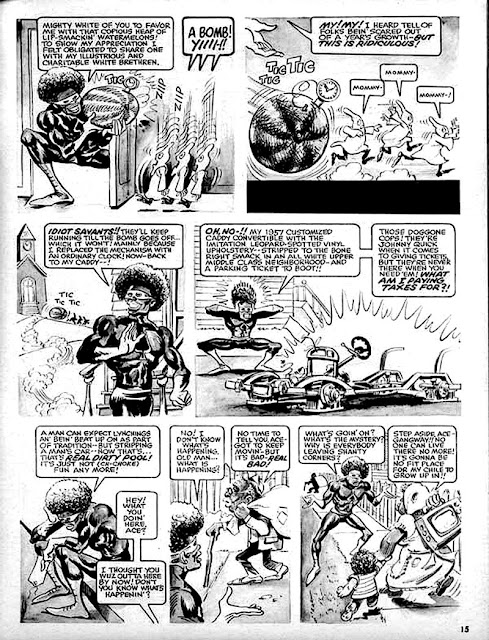When it comes to oddly unique stories, the coolest tale for Ebon doesn't appear on the pages of the comic. Cover-dated 1970, Ebon was published in December of 1969 in San Franciso when the undergrounds were in full bloom.
Larry Fuller had a desire to tell the story of an authentic black super hero, an idea that started a few years earlier, while he was still serving in the Air Force. After returning to civilian life and moving to San Francisco, he ran into what might seem like an insurmountable problem to any other man. He couldn't find an artist for the book. He did, however, have the G.I. Bill, which provided for college education for service veterans. So to accomplish his dream, he used it to go to art school and learn to draw the book - both pencils and inks.
While the comic suffers for the lack of a more experienced and polished inker, it's amazing to think it was created by someone who hadn't the skills to even attempt it only a 2 or 3 years before that point. The book stands as a testament to what ambition and drive can accomplish when a man has a vision and the will to achieve it.
The entire story runs 26 pages, so we'll be trimming a bit for length -
Our hero is taken up to the ship, and learns of Oju and his people - a once fearsome warrior race now dedicated to the prevention of destruction and violence. He explains that centuries ago "our greatest explorer, Jom, came here and found life!"
Jom's Heart acts as a catalyst, foreshadowing the Inhuman's Terrigenesis in later Marvel comics, and is rendered comatose. Oju's machines tend to Valentine while he undergoes his metamorphosis, and soon...
The book was published by Gary Arlington, a San Francisco comic shop owner, and it had exceedingly low distribution - fewer than 100 copies were sold.
Without being able to generate the necessary audience, issue 2 was never produced. Last i knew, Fuller still had designs on continuing the character, and mentions intent to do so on his website. However, it doesn't seem to have been updated in this century, so there's no telling there.
Quite interestingly, Fuller later wound up working together with Grass Green - the creator of Super Soul American from our previous post. As yet, i've been unable to find copies of those comics. Damn.
A little over a year later, another small publisher produced an even harder to find comic:
Written and published by Tom Floyd, with strong artwork from Eric O'Kelley, the book starred Steven Thomas who is transformed by a fairly generic laboratory accident into the Soul Wonder Of The World, with powers of Strength, Invulnerability and Flight. Leader Comics operated out of Indiana, which likely didn't help the distribution.
As we've seen above, distribution was a big problem for the independent publisher. There was, however, one black hero who got his own title from a major publisher way back in 1965...
We'll talk about Lobo next time...
Larry Fuller had a desire to tell the story of an authentic black super hero, an idea that started a few years earlier, while he was still serving in the Air Force. After returning to civilian life and moving to San Francisco, he ran into what might seem like an insurmountable problem to any other man. He couldn't find an artist for the book. He did, however, have the G.I. Bill, which provided for college education for service veterans. So to accomplish his dream, he used it to go to art school and learn to draw the book - both pencils and inks.
While the comic suffers for the lack of a more experienced and polished inker, it's amazing to think it was created by someone who hadn't the skills to even attempt it only a 2 or 3 years before that point. The book stands as a testament to what ambition and drive can accomplish when a man has a vision and the will to achieve it.
The entire story runs 26 pages, so we'll be trimming a bit for length -
Our hero is taken up to the ship, and learns of Oju and his people - a once fearsome warrior race now dedicated to the prevention of destruction and violence. He explains that centuries ago "our greatest explorer, Jom, came here and found life!"
Jom's Heart acts as a catalyst, foreshadowing the Inhuman's Terrigenesis in later Marvel comics, and is rendered comatose. Oju's machines tend to Valentine while he undergoes his metamorphosis, and soon...
The book was published by Gary Arlington, a San Francisco comic shop owner, and it had exceedingly low distribution - fewer than 100 copies were sold.
Without being able to generate the necessary audience, issue 2 was never produced. Last i knew, Fuller still had designs on continuing the character, and mentions intent to do so on his website. However, it doesn't seem to have been updated in this century, so there's no telling there.
Quite interestingly, Fuller later wound up working together with Grass Green - the creator of Super Soul American from our previous post. As yet, i've been unable to find copies of those comics. Damn.
A little over a year later, another small publisher produced an even harder to find comic:
Written and published by Tom Floyd, with strong artwork from Eric O'Kelley, the book starred Steven Thomas who is transformed by a fairly generic laboratory accident into the Soul Wonder Of The World, with powers of Strength, Invulnerability and Flight. Leader Comics operated out of Indiana, which likely didn't help the distribution.
As we've seen above, distribution was a big problem for the independent publisher. There was, however, one black hero who got his own title from a major publisher way back in 1965...
We'll talk about Lobo next time...


















































